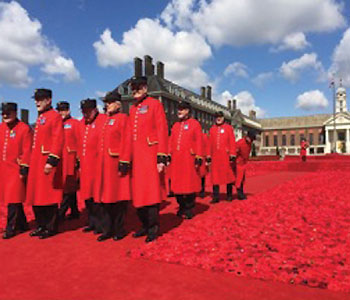|
READING POETRY TO THE PENSIONERS
The Royal Hospital, Chelsea
by Paul de Zulueta
formerly Welsh Guards
|
‘Slowly and sadly we laid him down in the field of his fame, fresh and gory’. But, before I could read the last line of Charles Wolfe’s haunting poem, ‘The Burial of Sir John Moore’, Frank, a 96 year old veteran and Japanese POW, his mind seemingly far away, looked up and with a tear running down his cheek, said ‘We carved not a line, and we raised not a stone; but we left him alone with his glory.’
 I have always enjoyed the consolations of poetry since I was given a copy, as a young officer, of Field Marshal Wavell’s ‘Other Men’s Flowers’, an anthology of his favourite poems which did much to sustain him during his darkest moments of the Second World War. But it was only a couple of years ago, when I read that English literature students at Exeter University were reading poetry to patients with dementia at local care homes, that I thought about how I might use my affection for poetry to ease the lives of others. I have always enjoyed the consolations of poetry since I was given a copy, as a young officer, of Field Marshal Wavell’s ‘Other Men’s Flowers’, an anthology of his favourite poems which did much to sustain him during his darkest moments of the Second World War. But it was only a couple of years ago, when I read that English literature students at Exeter University were reading poetry to patients with dementia at local care homes, that I thought about how I might use my affection for poetry to ease the lives of others.
An old friend of mine from the Welsh Guards, Simon Rhodes, was a volunteer at the Royal Hospital and introduced me to Theresa and Elly, the activities’ coordinators at the Margaret Thatcher Infirmary in the Royal Hospital. We agreed to set up a pilot session. There are no studies or scientific evidence to support the claims that poetry or reading groups help people affected by dementia. But there is experiential evidence to suggest that it does help unlock memory and improve cognitive skills. After all, how did Frank at the age of 96 suddenly recall the last line of Wolfe’s poem? He’d probably learnt it by rote as a boy. He may not have given it any thought for half a century, but the rhythm and cadence of the poem, with its emotional resonance for any soldier, sparked something strong in his mind.
I fretted perhaps too much over the pilot session. What poems should I choose? How long should they be? Should I ask the pensioners to read them as well as me? I read somewhere that Keats and Wordsworth, two English Romantic poets with their enduring sense of imagery, ‘Seasons of mists and mellow fruitfulness’; ‘I wandered lonely as a cloud’, worked well. But I decided to play safe and roll out the old favourites with Tennyson’s ‘Charge of the Light Brigade’, Wilfred Owen, W H Auden and my personal favourite, W B Yeats.
Two women pensioners came along. One, Dorothy, who had been an archivist at the Bodleian library after her military service, read Alfred Noyes ‘The Highwayman’ with the feeling and variation in pace it deserved. George, a former Oxfordshire and Buckinghamshire light infantryman, aged 95, read a poem written by his father about his job as a hedge cutter in 1912. George cried towards the end; emotions long dormant had been reawakened.
There was also the unexpected benefit that elderly people, though beautifully looked after and stimulated as they are at the Margaret Thatcher Infirmary, will always draw comfort from the companionship of each other in meaningful activity. We now do the poetry readings every month in the hospital infirmary.
If you would like to read poetry to the Pensioners at the Margaret Thatcher Infirmary in the Royal Hospital, please contact paul.dezulueta@lifestep.co.uk |
|

 I have always enjoyed the consolations of poetry since I was given a copy, as a young officer, of Field Marshal Wavell’s ‘Other Men’s Flowers’, an anthology of his favourite poems which did much to sustain him during his darkest moments of the Second World War. But it was only a couple of years ago, when I read that English literature students at Exeter University were reading poetry to patients with dementia at local care homes, that I thought about how I might use my affection for poetry to ease the lives of others.
I have always enjoyed the consolations of poetry since I was given a copy, as a young officer, of Field Marshal Wavell’s ‘Other Men’s Flowers’, an anthology of his favourite poems which did much to sustain him during his darkest moments of the Second World War. But it was only a couple of years ago, when I read that English literature students at Exeter University were reading poetry to patients with dementia at local care homes, that I thought about how I might use my affection for poetry to ease the lives of others.